Italian TT specialist almost fully recovered from fractured hip
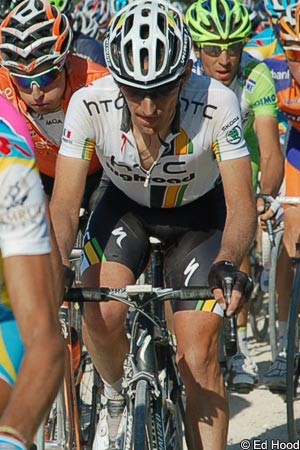 It was way back in 1999 when Marco Pinotti signed his first pro contract, with Lampre Daikin. The Italian team is still with us – and so is the time trial specialist from Bergamo.
It was way back in 1999 when Marco Pinotti signed his first pro contract, with Lampre Daikin. The Italian team is still with us – and so is the time trial specialist from Bergamo.
To use the clichéd comparison with wine, the 35 year-old gets better as every season passes.
This year was no exception; strong rides in Oman, Tirreno and Romandie were a precursor to his leading the storming HTC squadra across the line in the Giro’s first stage TTT in Turin and grabbing the second pink jersey of his career.
He narrowly missed victory on his ‘home’ stage 18 but on stage 19 disaster struck and, along with team mate, Craig Lewis, he ended up in hospital. Pinotti had a fractured hip and would face months off the bike. To add further dismay to his year, HTC announced they could not continue and thus Pinotti was looking for a job.
However he’s bounced back from both issues. His injury problems are almost completely behind him and next season sees him in action in the red and black of the ‘super squad’ BMC Racing Team.
Pinotti first came to prominence with a silver medal in the European U23 time trial championship in 1998 and that year he rode one late season race as a stagiaire for Polti – but it was Lampre who signed him for season 1999.
Neo-pro or not, he was thrown straight into the Tour de France, the experience can’t have done him too much harm – by the end of the season he’d won the now defunct GP d’Europa ‘two up’ team time trial with Latvian strong man, Raivis Belohvosciks.
The pair took second in the same race the following year and Pinotti paired with Swiss rider Rubens Bertogliati to occupy the same position in the Duo Normand. But an ’en ligne’ stage win in the Tour of Poland that year proved that Pinotti wasn’t just a ‘chrono man.’
In 2001 he rode the Tour and Vuelta and lined up again for the Tour in 2002 but was a non-finisher. The following year he took a stage in the Tour of the Basque Country with 2004 seeing him on the podium of the Italian time trial championship with a bronze medal.
Saunier Duval became home for 2005 and this coincided with the start of his love affairs with the Giro – where he finished 48th – and the Italian time trial champion’s jersey, which he pulled on for the first time.
The 2006 Giro saw him 60th overall in the Giro but ‘mountain man’ Marzio Bruseghin proved too strong in the Italian time trial championship and it was silver for Pinotti.
T-Mobile Team was the name on the jersey for 2007 and his progression continued with a Giro top 20 on GC and four days in the pink jersey.He took back his Italian time trial champion’s jersey and had strong rides in the Tours of Romandie, Denmark and Poland.
T-Mobile became High Road for 2008, and as well as retaining the red white and green jersey in the chrono, he took the final TT stage of the Giro (95th on GC), placed third in the Tour of Romandie and won overall in the Tour of Ireland.
More wins were on the way in 2009 when, with Columbia on board as title sponsor, he picked up a stage in the Basque Country, team time trials in the Tour of Romandie and Giro (40th on GC), the Italian time trial championship and the GP Citta di Stresa chrono.
The jersey colours changed again last season when HTC took over, and he once again brought big value to his sponsors. He rode strongly in Oman, the Basque Country, win the prologue in Romandie and missed victory in the Giro’s final TT by a scant two seconds to Gustav Larsson. This was Pinotti’s strongest Giro ever, finishing 9th on GC.
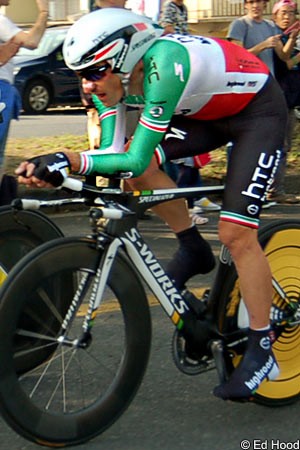 And it almost goes without saying that he won the Italian time trial championship for the fifth time.
And it almost goes without saying that he won the Italian time trial championship for the fifth time.
Now, back on the bike for several months and rebuilding strength, he’s looking forward to year one with the BMC Racing Team. VeloNation spoke to him as the Festive approached, but his thoughts were more on 2012’s race programme than Xmas dinner.
VeloNation: You’d a big crash in the Giro d’Italia. How is the recovery going, Marco?
Marco Pinotti: I’m well now, I’ve put in a good block of training over the winter and I’m looking forward to 2012.
I’m not at 100% yet. When I check my power, my right leg is a little bit weaker than my left…but the gap is coming down and by the time my season starts, there will be no difference.
VN: And when will the season start for you?
MP: In Majorca, I’ll do three days there and then fly to Oman. I’ve done good things in that race before but I prefer to have a few race days before it. That’s why I want to do Majorca.
My programmes is a good one…after Oman, I will do the Eroica, Tirreno and the Basque Country. I intend to skip the Classics and focus on my preparation for the Giro.
VN: It was a roller coaster Giro for you this year…
MP: For me it’s always a key race, this year ended in a very bad way for me but it’s forgotten and I’m sure for 2012 I’ll be back even stronger.
The last time trial in Milano is a big goal for me; it’s a hard Giro, but it always is!
We have Taylor Phinney for the prologue and we’re all looking forward to the team time trial. We’re very motivated by the prospect of this Giro.
VN: And you still love the Giro?
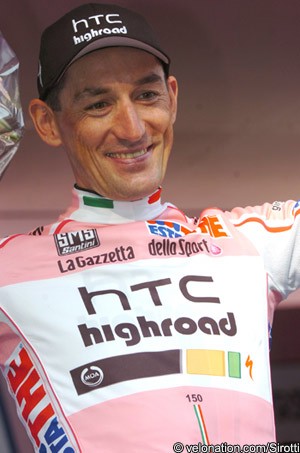 MP: Of course! I’ve ridden every year since 2005 – this will be my eighth Giro and I still have a passion for it.
MP: Of course! I’ve ridden every year since 2005 – this will be my eighth Giro and I still have a passion for it.
But not just the Giro, for my job in general, it’s a privilege to this job and my feelings for it are stronger than ever.
VN: You’ve been with Italian, Spanish and US teams…tell us about the different approaches.
MP: I started with Lampre, an Italian team but Saunier wasn’t really Spanish, it was as much Italian as Spanish in the approach.
There was a good family atmosphere and friendliness on these teams but with High Road it was different, not so much a question of national differences as a change in approach.
At High Road they were always searching for knowledge, for little ways to improve. I think going to High Road widened my approach to preparation and gave me a broader view.
The team still respected tradition but they were always keen to embrace new technology – power meters and GPS, for instance, and to look for the little differences.
VN: It must have been a blow when the team folded…
MP: I knew what was going on. I was out of action after my crash but I was following the situation in the media.
At the end of the Tour it looked as if the team may go forward but then within a week the decision was made to stop.
I think the decision was the right one…not waiting until the end of September or October when there would be no time to get a new contract.
VN: Some are saying that there are too many big riders for one team at BMC.
MP: But it’s also good to have more than one arrow in your quiver! We’re all professionals and know what’s expected of us…and there are so many races now.
In any race it’s always clear who your strongest rider is before you start and the team works for him – but if you have strong riders acting as domestiques, that’s when you can play good tactics.
It’s also generating a lot of media interest in the team, putting us under pressure. But I’ve worked under a lot of expectation for the past five years and work well in that position, I react positively to the pressure.
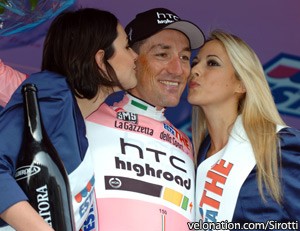 VN: On the subject of media, is the Italian passion for cycling still as strong?
VN: On the subject of media, is the Italian passion for cycling still as strong?
MP: The passion is still the same but times are changing, in the past there were only six or seven ‘cycling countries’ and Italy was one of them.
But the sport is global now and there are 15 or 20 countries with good riders and there are only two Italian Pro Tour teams, not six or seven big teams like there were before.
And the world economic situation is obviously a factor; businesses are cutting extra expenses and one of the first places they look is to marketing and promotion.
It’s still the peoples’ sport but the traffic conditions make it increasingly difficult to go out and ride on the open road.
The fields in races for youngsters have dropped since my day and I think a lot of that is how difficult it is to train safely on quiet roads.
VN: What’s your opinion on Mondialisation?
MP: In some ways it’s good because you have to attract new businesses and operate in new markets – it’s a way to attract fresh sponsors.
But there’s a balance with tradition and that’s a delicate process, it’s OK to have new races but you have to remember the sport’s traditions. I think it’s a situation which needs to be managed with intelligence.
VN: The UCI points system – is it good or bad?
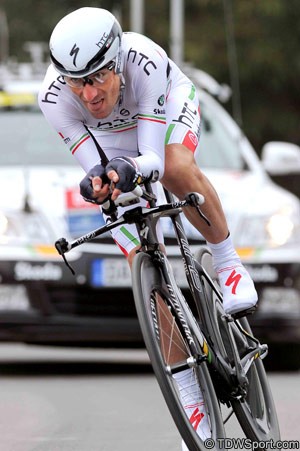 MP: When I started my career I raced within the old UCI points system which ran until 2004 and the Pro Tour came.
MP: When I started my career I raced within the old UCI points system which ran until 2004 and the Pro Tour came.
Riders complained about it back then and there are still downsides to it.
It’s not so bad for me but a rider can be a good team member and work hard for his leader…and then at the end of the season he has no points and it’s hard to get a contract.
VN: What about the race radio situation?
MP: I’ve raced with and without radio, and for me it’s not so important. I don’t think that it would change the outcome of races…there are always means to communicate.
The main thing it means is that reactions are a little slower, so maybe there’s more chance of a break succeeding… And then there’s the aspect of accident or defect – but it’s the same for all.
VN: Next season will be your 14th in the pro peloton…what are the biggest changes you’ve seen?
MP: Language…when I started I was told that I had to learn French, it was the international language of cycling. If you could speak French and Italian that covered pretty much the whole peloton.
But it’s is a skill you need now – sponsors, staff and riders across the sport use English as the universal language. And social media has made a big difference…the sport is more open, evolving all the time, you know what everyone is doing.
VN: Do you miss your Italian time trial champion’s jersey?
MP: Of course I miss it!
The race is always an important point in my season; after the Giro I will ride the Tour de Suisse as preparation for the National Championships.
It’s not just the race result, it’s also that it’s an important event for Olympic selection…and I’d really like to ride in London.